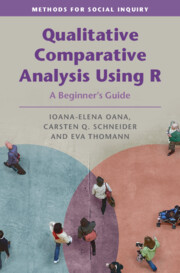7 - Summary and Outlook
Published online by Cambridge University Press: 07 October 2021
Summary
This last, consolidating chapter has four goals. The first is consolidation: we specify appropriate case selection strategies for research using QCA and summarize an integrated protocol for analyzing set relations in an iterative manner, which bases inferences on cross-case patterns, knowledge of individual cases, and external knowledge. This protocol follows three main steps both for necessary and for sufficient conditions: determining empirical consistency, empirical importance, and substantive importance. The second goal is to broaden the perspective: we discuss the diverse variants, uses, and analytic goals of QCA in different research designs. We argue that for deriving valid inferences with QCA, it is important to coherently choose tools in line with analytic approaches. Third, we summarize and update good practices for conducting QCA and presenting and visualizing its results. Lastly, we map exciting developments that are likely to shape the field in the foreseeable future, including a summary of prominent software functionality.
Learning goals:
- Consolidated knowledge of the analytic protocol of QCA.
- Overview of different uses of QCA, their analytic goals and corresponding tools.
- Overview of recommendations for good practice and transparency before, during, and after the analytic moment.
- Outlook of possible developments in the field.
Keywords
- Type
- Chapter
- Information
- Qualitative Comparative Analysis Using RA Beginner's Guide, pp. 201 - 223Publisher: Cambridge University PressPrint publication year: 2021



